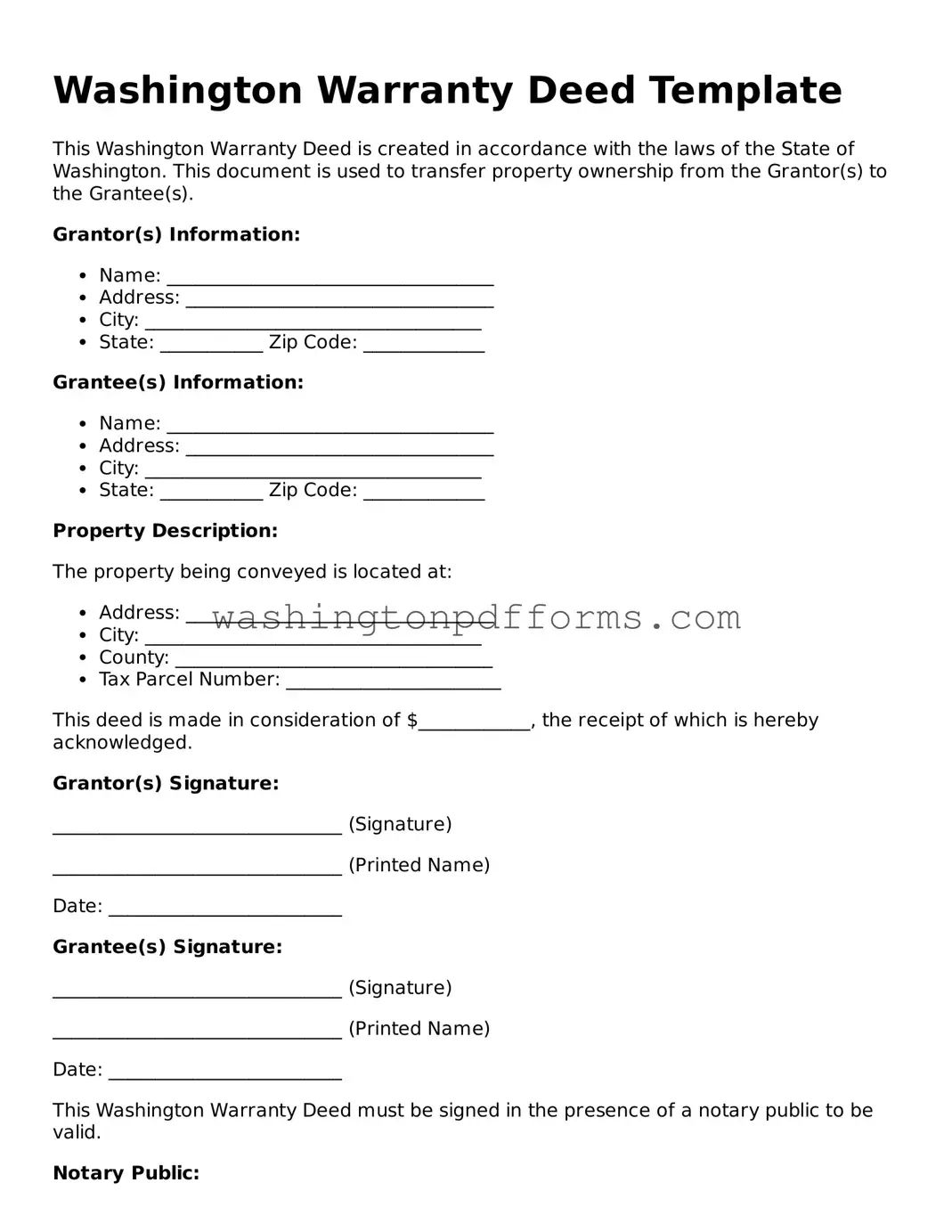Attorney-Approved Washington Deed Template
The Washington Deed form plays a crucial role in the transfer of real property ownership within the state. This legal document serves as a formal record of the transaction, outlining the details necessary for a valid transfer. Key components of the form include the names of the grantor and grantee, a clear description of the property, and any pertinent conditions or restrictions related to the transfer. The form must be signed by the grantor, and in some cases, notarization is required to ensure its authenticity. Additionally, the Washington Deed form may be accompanied by supplementary documents, such as a title report or property survey, to provide further clarity and assurance to both parties involved. Understanding these elements is essential for anyone looking to navigate the real estate landscape in Washington state.
Common mistakes
Filling out the Washington Deed form can seem straightforward, but many people make common mistakes that can lead to complications. One frequent error is not including the correct legal description of the property. This description must be precise and match the information on the title. Omitting or miswriting this detail can result in delays or even legal disputes.
Another mistake involves the names of the parties involved. It is essential to ensure that the names of the grantor (the seller) and grantee (the buyer) are spelled correctly and match their official identification. Any discrepancies can lead to issues with the transfer of ownership.
People often overlook the requirement for notarization. A deed must be signed in the presence of a notary public to be legally binding. Failing to have the deed notarized can render it invalid, causing significant problems down the line.
Additionally, some individuals forget to include the date of execution. This date is crucial as it establishes when the transfer of ownership takes place. Without it, the deed may be challenged or deemed incomplete.
Another common mistake is neglecting to check for outstanding liens or encumbrances on the property. Failing to disclose these can lead to future legal issues for the grantee. It is vital to conduct thorough research before completing the deed.
People sometimes use vague or informal language in the deed. Clarity is key. Using precise legal terms helps avoid ambiguity and ensures that the intentions of both parties are clear.
Some individuals also forget to include the appropriate tax information. In Washington, real estate transactions may be subject to excise taxes. Not providing this information can lead to unexpected financial obligations.
Finally, failing to keep copies of the completed deed is a mistake that can have serious consequences. Always retain a copy for personal records and provide one to the grantee. This ensures that both parties have access to the necessary documentation in the future.
Similar forms
Lease Agreement: This document outlines the terms between a landlord and tenant. Like a deed, it transfers rights to use property, but for a limited time rather than ownership.
-
BBB Complaint Form: This form allows consumers to formally address grievances against businesses that have not fulfilled their service or product expectations, paving the way for resolution through the protocols established by the Better Business Bureau. For further details, you can visit TopTemplates.info.
Bill of Sale: This form transfers ownership of personal property from one party to another. Similar to a deed, it serves as proof of ownership transfer, but it typically pertains to movable items rather than real estate.
Title Transfer Document: This document is used to officially transfer ownership of a vehicle or other property. It functions like a deed by recording the change of ownership and ensuring the new owner has legal rights.
Power of Attorney: This form allows one person to act on behalf of another. It shares similarities with a deed in that it grants authority and rights, but it does not transfer ownership; instead, it delegates decision-making power.
Some Other Washington Templates
Divorce Washington State - It can foster cooperation between ex-spouses, especially when children are involved.
How to Make a Nda Legal - Use a Non-disclosure Agreement to mitigate risks when exploring joint ventures.
If you're addressing a troublesome situation, our detailed guide on how to fill out a Cease and Desist Letter could be invaluable. You can find it by following this link: detailed guide to Cease and Desist Letter.
Operating Agreement Llc Washington State - It demonstrates to stakeholders the professionalism and preparedness of the LLC.
